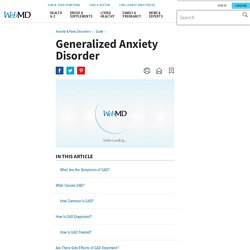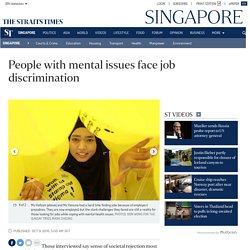

What is Psychological Disorders? What exactly is a psychological disorder? How is a psychological disorder diagnosed? Defining exactly what constitutes a mental disorder can be tricky and, definitions have changed over time. The first problem is that psychologists must first decide exactly how to define disorder. A List of Psychological Disorders. Anxiety disorders are those that are characterized by excessive and persistent fear, worry, anxiety and related behavioral disturbances.5 Fear involves an emotional response to a threat, whether that threat is real or perceived. Anxiety involves the anticipation that a future threat may arise.
Types of anxiety disorders include: Generalized Anxiety Disorder (GAD) This disorder is marked by excessive worry about everyday events. While some stress and worry are a normal and even common part of life, GAD involves worry that is so excessive that it interferes with a person's well-being and functioning. Agoraphobia This condition is characterized by a pronounced fear a wide range of public places. Because of this fear, those with agoraphobia often avoid situations that might trigger an anxiety attack.
Understanding Mental Health in Singapore. Fast Facts on Mental Health in Singapore. 51% of mental illness patients suffer from a chronic physical illness, because there is a link between the twoDepression, alcohol abuse and obsessive compulsive disorder are the top 3 most common disorders in Singapore29 The age at which the majority of mental illnesses occur5.8% of the adult population in Singapore has suffered from depression at some point in their lives Symptoms of top 3 disorders Depression: loses interest in daily life, has feelings of hopelessness and thoughts of suicide Alcohol Abuse: has to drink more and more alcohol to feel its effects as tolerance for the substance increases, experiences sweating and other withdrawal symptoms when not drinking.
1 in 7 people in Singapore have experienced a mental disorder – and some millennials are more susceptible to mood and alcohol-related ones, Business Insider - Business Insider Singapore. More people in Singapore have experienced a mental disorder in their lifetime, study finds. 6 common mental disorders affecting Singaporeans today and where you can go to get help, Business Insider - Business Insider Singapore.
Pexels. OCD one of the most common mental disorders in Singapore. SINGAPORE: Obsessive compulsive disorder (OCD) is one of most common mental health conditions here, according to findings from a nationwide study released on Tuesday (Dec 11). The disorder affected one in 28 people in their lifetime, making it the third-most prevalent condition after major depressive disorder and alcohol abuse. The illness is commonly characterised by recurrent and persistent thoughts, impulses or images, and when severe, impedes a person's ability to function. Younger people aged 18 to 34 were more likely to have the condition than those aged 50 and above, said researchers from the Institute of Mental Health (IMH) and Nanyang Technological University (NTU), citing the findings from the second Singapore Mental Health Study. The study also found that those who had a monthly household income of between S$2,000 and S$3,999 were less likely to have the condition than those with a household income of less than S$2,000.
IMHchartx. Treatmentdelayx. OCD in top three mental disorders, sufferers seeking help later. Study shows Obsessive Compulsive Disorder affects one in 28 people here and sufferers are delaying treatment longer Afraid that someone would break into his house, he would check the locks on his front gate and door.

He was so anxious about making a mistake and letting a burglar slip through that he would repeat this 50 to 60 times. "He would end up not being able to do anything else because he would be terribly late for appointments. "It came to a point where he seldom could make it for work," said senior psychologist at The Therapy Room Lawrence Tan, 40. He was describing the debilitating effect an obsessive compulsive disorder (OCD) can have on a sufferer. His comments came in the wake of the latest national mental health study, which showed that OCD remains one of the top three mental illnesses here. OCD is poorly understood and public awareness about the signs and symptoms, which can be hard to recognise, is lacking.
#1 - Major Depressive Disorder. #2 - Alcohol abuse. Effects of Alcohol Abuse Alcohol abuse and mental illness constitute a major public health problem.0.7% of all years of life lost to poor health, disability or early death can be attributed to alcohol--the most for any psychoactive substance. 5.76% can be attributed to mental disorders.Additionally, mental disorders are responsible for around 19% of the Years Lived with Disability (YLD) world over. More importantly, alcohol addiction and mental disorders tend to co-occur at a frequency greater than what would be expected by chance.General population based surveys have documented that the odds of developing a mood disorder and an anxiety disorder are 3.6 and 2.6 times higher, respectively, if someone is dependent on alcohol as compared to one who is not dependent on alcohol. If you or someone you love is struggling with alcohol abuse or addiction, chances are that they might have an underlying mental health condition, like depression.
Dual diagnosis treatment can help with both. 1. 2. 3. #3 - Obsessive-Compulsive Disorder. #4 - Generalised Anxiety Disorder. Generalized anxiety disorder (or GAD) is characterized by excessive, exaggerated anxiety and worry about everyday life events with no obvious reasons for worry.

People with symptoms of generalized anxiety disorder tend to always expect disaster and can't stop worrying about health, money, family, work, or school. In people with GAD, the worry is often unrealistic or out of proportion for the situation. Daily life becomes a constant state of worry, fear, and dread. Eventually, the anxiety so dominates the person's thinking that it interferes with daily functioning, including work, school, social activities, and relationships. What Are the Symptoms of GAD? GAD affects the way a person thinks, but the anxiety can lead to physical symptoms, as well. #5 - Bipolar Disorder. #6 - Alcohol Dependence. A Social Experiment on Mental Health Stigma. People with mental issues face job discrimination, Singapore News.
The hallucinations and delusions started in her late teens.

Then five years ago, Ms Hafizah Kamarulzaman was diagnosed with schizophrenia after giving birth to her son. While the single mother, now 23, managed to control her condition after seeking help, she struggled to get a job for almost four years, she told The Sunday Times. She described how she was turned down for positions in the food and beverage and healthcare sectors, on the sidelines of an event called "Walk with Us, Stamp out Stigma". It was held in Orchard Road yesterday to combat the stigma faced by people with mental health conditions. She said: "When the boss saw in my application form for a waitressing job that I had a mental illness, he asked what would happen if I had a relapse. "His response was, 'If that's the case, then our position is full'. " Many still steer clear of people with mental illness: Poll, Singapore News.
Even as more people are seeking outpatient treatment at the Institute of Mental Health (IMH), more than five in 10 respondents in a recent survey indicated they are unwilling to live with, live nearby or work with a person with a mental health condition. The survey, which is the first of its kind by the National Council of Social Service (NCSS), found that most people agree that more needs to be done to reduce societal stigma, yet they are also reluctant to accept them on an individual level.
Pang 2017 Stigma among Singaporean youth a cr. The stigma of depression: Those who suffer in silence. SINGAPORE: When Madam Junainah Eusope was first diagnosed with depression almost 15 years ago, shame was the first thing she felt. “I asked the doctor what illness I had, and he said it was a mental illness. And that’s when it hit me,” she recounted. “I used to visit patients in Woodbridge Hospital, and I used to laugh at them. Was I now one of them?” She said. Life was not easy for Mdm Junainah and her family.
She did not dare look for work, as she was worried that the stress would cause her to have a relapse. Mdm Junainah’s diagnosis is not uncommon: according to statistics from the Institute of Mental Health, more people have been coming forward to seek treatment for Major Depressive Disorder (MDD), or clinical depression. NCSS - What we can do to address stigma. The Movement’s desired outcomes for employers are: Provide a safe and supportive environment for disclosure Adopt more inclusive hiring practices and put in place workplace accommodations Equip colleagues with confidence and knowledge to support persons with mental health conditions In May 2018, a WorkWell Leaders Workgroup comprising private and public sector leaders was formed to champion workplace wellbeing as a leadership priority.
As its first collective action, the workgroup rallied employers to support the Beyond the Label campaign in the workplace on 10 October 2018, World Mental Health Day. These employers also pledged their commitment to the cause beyond the day. Click here for the list of employers who have pledged. If you would like to find out more or be part of this movement, please contact the Mental Health Services team at ncss_mental_health@ncss.gov.sg. Stop the Stigma.
Mental health: Overcoming the stigma of mental illness. Sumaiyah's story of resilience and recovery from schizophrenia. Desmond’s story of resilience and recovery from schizophrenia. Nicholas’ story of resilience and recovery from depression. Nicole’s story of resilience and recovery from depression and anxiety. Directory on Mental Health Services (NCSS) Getting Help - Over The Rainbow. Child Guidance Clinic (CGC)Offers mental health and educational services for children and youths up to 19 years of age.
Most patients are experiencing emotional and behavioural problems requiring professional intervention, not mental illnesses. Locations: Child Guidance Clinic (CGC), Health Promotion Board (HPB) Second Hospital Avenue, #03-01, Singapore 168937 Tel: 6389 2220 Email: hpb@imh.com.sg Hours: Mon-Fri, 8am–5pm Sunrise Wing, Child Guidance Clinic (CGC) Buangkok Green Medical Park (BGMP) Block 3, Basement 10, Buangkok View, Singapore 539747 Tel: 6389 2220 Email: imh_appt@imh.com.sg Hours: Mon-Thu, 8am–5:30pm; Fri, 8am-5pmÂ. Samaritans of Singapore (SOS) Community Facilities.